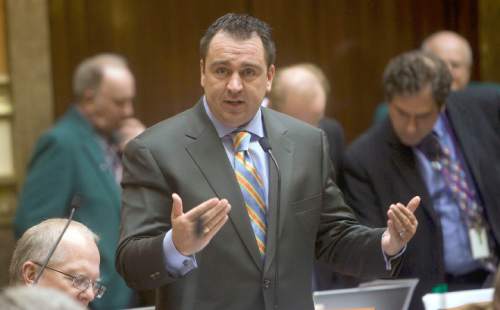This is an archived article that was published on sltrib.com in 2016, and information in the article may be outdated. It is provided only for personal research purposes and may not be reprinted.
In every state, citizens are empowered to elect those state and local leaders they feel will best represent their interests and protect their freedoms and way of life. In our federal republic, this was meant to lend a robust balance to the power of the people against a potentially tyrannical federal government.
In 2012, the Supreme Court stated that "state sovereignty is not just an end in itself: Rather, federalism secures to citizens the liberties that derive from the diffusion of sovereign power. … the facets of governing that touch on citizens' daily lives are normally administered by smaller governments closer to the governed. The framers thus ensured that powers which 'in the ordinary course of affairs, concern the lives, liberties, and properties of the people' were held by the governments more local and more accountable than a distant federal bureaucracy. The independent power of the States also serves as a check on the power of the Federal government … "
How does this work in Utah, where federal bureaucrats over 2,000 miles away exercise police power over far more of Utah than Gov. Gary Herbert or our elected legislators? The citizens of the state are unable to vote out unelected federal officials with control over the majority of our land. Consequently, we do not have the same protections from arbitrary power as do citizens of those 38 states without significant federal land ownership.
Our leaders are often unable to independently make decisions regarding what is in the best interest of the people they represent without permission from one of these Washington bureaucrats. Utah cannot take federal lands for public improvements and is oftentimes impotent in its ability to build roads, connect communities, lay cable and expand broadband service across large swaths of the state. This limits the development of commerce, hinders the growth of population and obstructs Utah's capacity to gain greater political power at the federal level. After all, seats in the U.S. House of Representatives and Electoral College votes are allocated according to population. Limit the ability of western states to increase population, and you limit their power in Washington.
All of this puts Utah at a permanent political disadvantage and skews the "harmonious operation of the scheme upon which the Republic was organized."
Furthermore, arguments have been made that Utah wouldn't be able to bear the burden of managing 31 million additional acres of public land. That is only the case if Utah were as ineffective and inefficient in its management as is the federal government.
The Commission for the Stewardship of Public Lands has asked these very questions. Not only has a 2015 legal analysis shown a strong constitutional basis for state ownership, but a number of economic studies have clearly shown Utah to be capable of efficient state management. We have repeatedly been found to be one of the best managed states in the nation; this is not by chance. All of the evidence says that we are fully capable of managing our own lands and doing so in a fiscally sustainable way.
It's time for Utahns to decide if we want to fight to be fully equal participants in our republic or if we're satisfied being relegated to second-class status. This is the only real question left to answer. The choice is ours to make.
Sen. David P. Hinkins and Rep. Keven J. Stratton serve as co-chairs of the Commission for Stewardship of Public Lands. Sen. Wayne Neiderhauser is Senate President. Rep. Greg Hughes is Speaker of the House.



